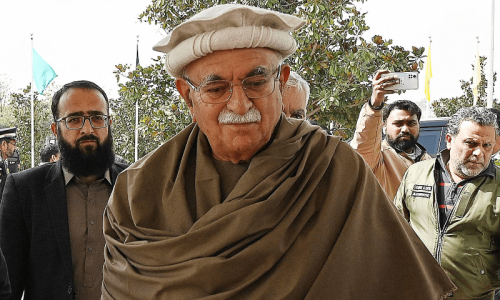IT has been the usual practice of Pakistani politicians facing harassment or more intense persecution at home to look for safety and comfort in London. Following his ouster from the presidency in October 1958, Iskander Mirza lived there for the rest of his days.
The pension he received from Ayub Khan's government did not go far and he worked in a middle management position in a hotel to supplement his income. He chose to remain silent on the affairs of Pakistan.Altaf Hussain, the MQM boss, has been living in London for a number of years now. He directs the affairs of his party in Pakistan from his offices in London. Other leaders, Benazir Bhutto among them, resided in London for periods of time. They commented on political developments in Pakistan and, while in London, tried to guide their followers back home.
Gen Pervez Musharraf has been residing in London, for some months and it is hard to say when he will return as doing so at present could be hazardous to his life and limb. Revisiting recently the Nov 3 emergency the Supreme Court 'invited' (not summoned) Gen Musharraf to appear before court to explain his action. Considering that his Oct 12, 1999 coup and subsequent rule have led certain parties to call for his trial for treason under Article 6, it is easy to understand why he is inclined to stay on in London. He, accordingly, chose to ignore the Supreme Court's invitation.
Had he returned to Pakistan and appeared in court, what could he have said? I imagine something along the following lines 'Yes, I executed a coup d'état on Oct 12, 1999 and I imposed emergency rule on November 3, 2007. Yes, in taking these actions I violated the constitution. But this honourable court validated my violations as extra-constitutional measures that had become necessary and, therefore, proper. So, what is there for me to explain? In validating my violations the court followed its own tradition it had validated similar, if not worse, violations committed by Gen Ziaul Haq, and Gen Ayub Khan. The chief justice of this honourable court is judging an action of mine which entailed his own dismissal. He is acting as a judge in his own cause.'
This reasoning was not presented to the court which examined
Gen Musharraf's imposition of emergency and held that it had been contrary to the constitution and so were many of the actions that flowed from it. The court declared that Justice Abdul Hameed Dogar's appointment as chief justice had been unconstitutional and illegal as was that of the other judges who had taken oath under the PCO.
Thus, Chief Justice Chaudhry and his colleagues cleaned up their own house. A distinguished lawyer from Pakistan mentioned to me the other day that so thoroughly sweeping had the operation been as to have left the Lahore High Court with only seven judges (instead of more than 50 that it normally has).
The court has not gone beyond judicial house-cleaning. It did not touch Musharraf's remaking of the country's political system. It did not void the ordinances he had issued following the emergency and left it to parliament to do with them as it might deem fit. It repudiated some of Musharraf's actions but did not hold him guilty of a crime and did not award him any punishment.
It may now be appropriate to take note of the damage caused by Gen Musharraf's violations. Apart from the fact that he overthrew an elected government, set up a dictatorship and militarised the country's governance, he amended its constitution on a huge scale and, in the process, mutilated it. Second, he weakened the nation's political institutions by dissolving, suspending or ignoring them.
Following the general elections of February 2008, political forces in parliament and civil society demanded President Musharraf's impeachment. With an elected government in place, he had lost much of his former authority and power by this time. Weakened and harassed, he resigned as president in August 2008. He resided in the Army House in Rawalpindi for a time and then moved to London where he now lives.
One may wonder how the general is occupying himself in London. Reports have it that he has been delivering speeches at various places on extremism and militancy and Pakistan's ongoing fight to eradicate them. The president of a public relations firm said that he could command between $150,000 and $200,000 for each appearance. If this is the case, it would seem he is doing well for himself. The likelihood is that speaking invitations coming his way will decline, for he has probably exhausted the subject of extremism and his expertise does not include much else.
During the months preceding his retirement he discounted speculation that at some point he might enter politics. In fact he did have a strong association with Chaudhry Shujaat Hussain and other leaders in PML-Q. He continues to have their support. He was recently reported to have met some and might have consulted them about his prospects in the politics of Pakistan a few years from now.
The writer is professor emeritus at the University of Massachusetts.
anwarsyed@cox.net













































Dear visitor, the comments section is undergoing an overhaul and will return soon.